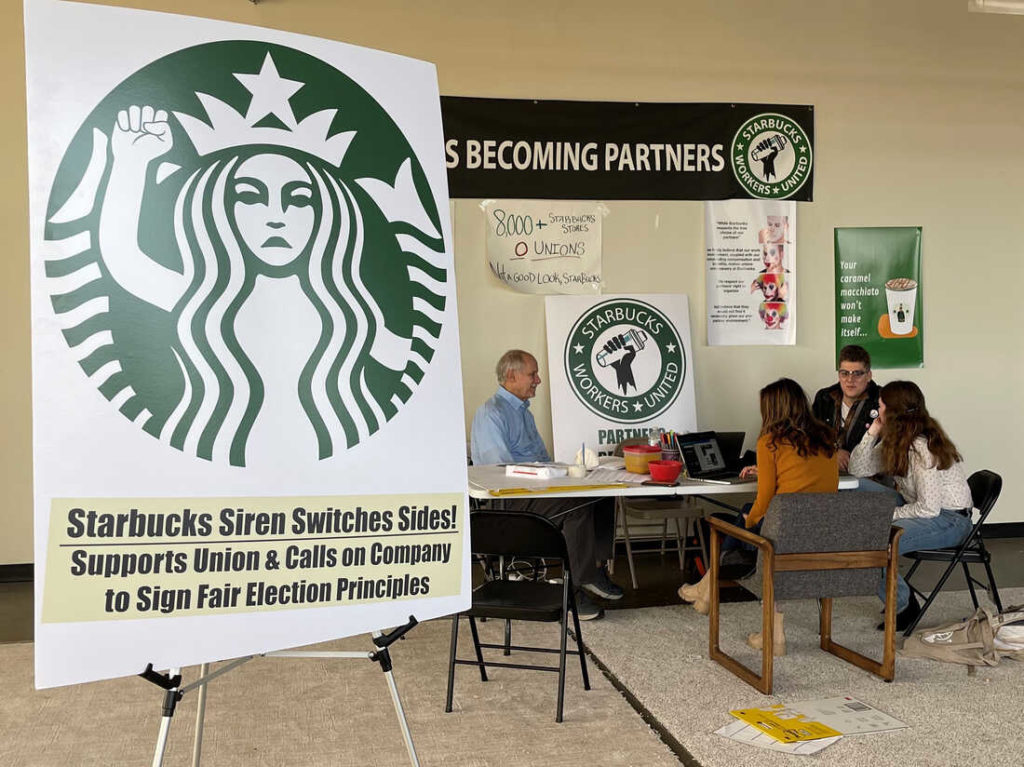What Does Growing Union Support Mean?

Unions have polled pretty high among the electorate for awhile, but have surged recently. At the same time, there have been a number of high-profile union campaigns, most notably at Amazon and Starbucks. What does it mean?
From Starbucks to Amazon to Apple, the recent headlines show that the biggest companies in the world can’t duck the union issue. But the issue isn’t isolated to a few iconic companies operating in retail. While union membership remains at a multi-decade low, a CNBC survey finds that a majority (59%) of workers across the U.S. and across all sectors say they support increased unionization in their own workplaces.
The recent CNBC|Momentive Workforce Survey reinforces recent findings from Pew Research Center and Gallup polls, which both show widespread support for labor unions among the public. And it does not break down into a clearly partisan political issue. While Democrats are about twice as likely as Republicans to have a positive view on unions, the CNBC survey finds bipartisan support, with 46% of Republicans in favor of increased unionization at their work.
“This really isn’t the partisan issue that many assume,” said Laura Wronski, senior manager of research science at Momentive, which conducted the survey for CNBC in May among more than 9,000 workers across the country.
What is taking place in the current labor market is unlike anything since the late 1970s, according to MIT Sloan School of Management professor Thomas Kochan, who has been studying unionization and conducting his own surveys on the issue. For several decades starting in the late 1970s, only one-third of workers nationally said they would vote “yes” to a union. But in 2017, that number jumped to 48%. “That was the first indication of a big change and all the evidence since has reinforced that,” Kochan said.
This is unquestionably positive. The question I have is whether people act on this. In other words, when people make political decisions, they are not operating in a vacuum. They are influenced by background, religion, race, gender, etc. This is true when they face a union vote or when they go to the polls for a political election. Every union organizer knows that if you only have 60% of the workplace signed up for the union, you are probably going to lose said election because you will lose a lot of those people at the vote, even though it is a secret vote.
So taken in said vacuum, supporting unions is not a partisan issue. But one party hates unions and the other, well, sort of supports them. Does this consciousness impact workers when they make voting choices? Often it does not. Sometimes it does. We know that union membership is the best way for working class people to gain an understanding of their economic interests and vote upon them. This is one reason why Republicans hate unions so much.
What we do know is that we have this little spike in union elections and quite a spike in organizing workplaces that perform liberalism but still treat workers like garbage. Maybe this is starting to spread to the many other non-liberal performing companies that treat workers like garbage. This interesting story about a worker at Dollar General is a good example of what could come. Certainly companies are very worried about all of this and are acting accordingly by throwing millions at union-busting law firms to come in and engage in a full fledged propaganda campaign against their own workers, such as Apple is doing.
So we will see. I think there’s plenty of reason to be skeptical that all of this will lead to the kind of longer-term consciousness change that will bring the needed politics with it to see this through. But all you can do is keep fighting for it.


